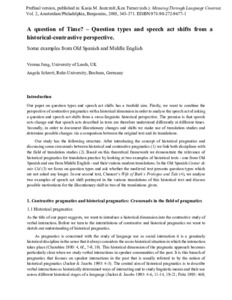| dc.date.accessioned | 2021-05-31T13:45:04Z | |
| dc.date.available | 2021-05-31T13:45:04Z | |
| dc.date.issued | 2003 | |
| dc.identifier | doi:10.17170/kobra-202105193937 | |
| dc.identifier.uri | http://hdl.handle.net/123456789/12879 | |
| dc.language.iso | eng | eng |
| dc.publisher | John Benjamins Publishing Company | |
| dc.rights | Urheberrechtlich geschützt | |
| dc.rights.uri | https://rightsstatements.org/page/InC/1.0/ | |
| dc.subject.ddc | 400 | |
| dc.title | A question of time? Question types and speech act shifts from a historical-contrastive perspective | ger |
| dc.type | Teil eines Buches | ger |
| dcterms.abstract | Our paper on question types and speech act shifts has a twofold aim. Firstly, we want to combine the perspective of contrastive pragmatics with a historical dimension in order to analyse the speech act of asking a question and speech act shifts from a cross-linguistic historical perspective. The premise is that speech acts change and that speech acts described in texts are therefore understood differently at different times.
Secondly, in order to document illocutionary changes and shifts we make use of translation studies and determine possible changes via a comparison between the original text and its translations. Our study has the following structure. After introducing the concept of historical pragmatics and discussing some crossroads between historical and contrastive pragmatics (1) we link both disciplines with the field of translation studies (2). Based on this theoretical framework we demonstrate the relevance of historical pragmatics for translation practice by looking at two examples of historical texts - one from Old Spanish and one from Middle English - and their various modern translations. In the Old Spanish Cantar de mio Cid (3) we focus on question types and ask whether the medieval text presents question types which are not asked any longer. In our second text, Chaucer’s Wife of Bath’s Prologue and Tale (4), we analyse two examples of speech act shift portrayed in the various translations of this historical text and discuss possible motivations for the illocutionary shift in two of the translations given. | eng |
| dcterms.accessRights | open access | |
| dcterms.creator | Jung, Verena | |
| dcterms.creator | Schrott, Angela | |
| dc.publisher.place | Amsterdam | |
| dc.relation.doi | doi:10.1075/pbns.100.21jun | |
| dc.subject.swd | Historische Pragmatik | ger |
| dc.subject.swd | Illokutiver Akt | ger |
| dc.subject.swd | Interrogativsatz | ger |
| dc.subject.swd | Übersetzungstheorie | ger |
| dc.subject.swd | Englisch | ger |
| dc.subject.swd | Spanisch | ger |
| dc.title.subtitle | Some examples from Old Spanish and Middle English | ger |
| dc.type.version | acceptedVersion | ger |
| dcterms.source.collection | Meaning Through Language Contrast : Volume 2 | eng |
| dcterms.source.editor | Jaszczolt, Katarzyna M. | |
| dcterms.source.editor | Turner, Ken | |
| dcterms.source.identifier | doi:10.1075/pbns.100 | |
| dcterms.source.identifier | isbn:978-90-272-5120-6 | |
| dcterms.source.identifier | isbn:978-1-58811-207-1 | |
| dcterms.source.identifier | eisbn:978-90-272-9677-1 | |
| dcterms.source.pageinfo | 345–371 | ger |
| dcterms.source.series | Pragmatics & Beyond New Series ;; 100 | ger |
| kup.iskup | false | ger |

